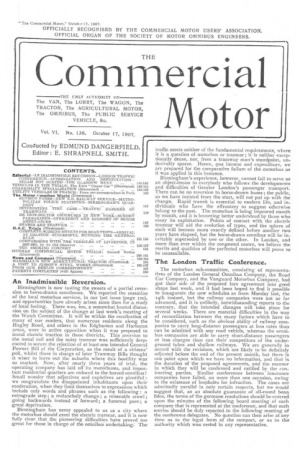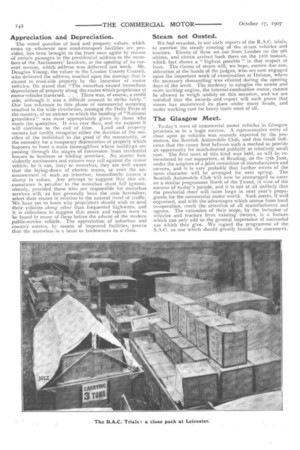An Inadmissible Reversion.
Page 1

Page 2

If you've noticed an error in this article please click here to report it so we can fix it.
Birmingham is now tasting the sweets of a partial reversion to horse-drawn omnibuses. We reported the cessation of the local motorbus services, in our last issue (page 120), and opportunities have already arisen since then for a study of local feeling. There was, too, a somewhat heated discussion on the subject of the change at last week's meeting of the Watch Committee. It will be within the recollection of many of our readers, that numerous residents along the Hagley Road, and others in the Edgbaston and Harhome areas, were in active opposition when it was proposed to instal electric traction in those districts. This aversion to the metal rail and the noisy tramcar was sufficiently deeprooted to secure the rejection of at least one intended General Powers Bill of the Corporation, as the result of a citizens' poll, whilst those in charge of later Tramway Bills thought it wiser to leave out the suburbs where this hostility was so marked. Now, after nearly three years of trial, the operating company has laid off its motorbuses, and important residential quarters are reduced to the horsed omnibus ! Small wonder that adjectives and expletives are plentiful : we congratulate the disappointed inhabitants upon their moderation, when they limit themselves to expressions which include only words and phrases such as the following : a retrograde step; a melancholy change ; a miserable crawl ; going backwards instead of forward ; a funereal pace ; a great deprivation.
Birmingham has never appealed to us as a city where the motorbus should excel the electric tramcar, and it is now fully clear that the pioneering difficulties have proved too great for those in charge of the omnibus undertaking: The
traffic meets neither of the fundamental requirements, where it is a question of motorbus or tramcar; it is neither exceptionally dense, nor, from a tramway man's standpoint, undesirably sparse. Hence, qua income and expenditure, we are prepared for the comparative failure of the motorbus as it was applied in this instance.
Birmingham's experience, however, cannot fail to serve as an object-lesson to everybody who follows the developments and difficulties of Greater London's passenger transport. There can be no reversion to horse-drawn buses ; the public, as we have insisted from the start, will not put up with the change. Rapid transit is essential to modern life, and individuals who have the effrontery to suggest otherwise belong to the past. The motorbus is being improved month by month, and it is becoming better understood by those who essay its exploitation. Points of contact with the electric tramcar will aid the evolution of types, and the sphere of each will become more exactly defined before another two years have elapsed, but the horse-drawn omnibus will be inevitably superseded by one or the other. In London, and more than ever within the congested centre, we believe the merits and qualities of the perfected motorbus will prove to be unassailable.
The London Traffic Conference.
The motorbus sub-committee, consisting, of representatives of the London General Omnibus Company, the Road Car Company, and the Vanguard Motorbus Company, had got their side of the proposed fare agreement into good shape last week, and it had been hoped to find it possible to inaugurate the new schedules as from Monday last, the x4th instant, but the railway companies were not so far advanced, and it is unlikely, notwithstanding reports to the contrary, that the intended changes will take place for several weeks. There are material difficulties in the way of reconciliation between the many factors which have to he considered, such as the obvious ability of railway companies to carry long-distance passengers at less rates than can be admitted with any road vehicle, whereas the omnibus companies are able to carry short-distance passengers at less charges than can their competitors of the underground tubes and shallow railways. We are generally in accord with the revisions, which are likely to be definitely adjusted before the end of the present month, but there is one point upon which we have no information., and that is the duration of the proposed agreements, and the manner in which they will be confirmed and ratified by the contracting parties. Similar conferences between insurance companies have failed, on more than one occasion, owing to the existence of loopholes for infraction. The cases areadmittedly parallel in only certain respects, but we would suggest that, as an absolute guarantee of all-round bona fides, the terms of the germane resolutions should be entered upon the minutes of the following board meeting of each company that is represented at the conference, and that such entries should be duly reporte&to the following meeting of the conference delegates. No question can then arise at any time as to the legal form of the compact, or as to ther authority which was vested in any representative.
Appreciation and Depreciation.
The vexed question of land and property values, which crops up whenever new road-transport facilities are provided, has been brought to the front once again by reason of certain passages in the presidential address to the members of the AuctioneerS' Institute, at the opening of its current session, which address was delivered last week. Mr. Douglas Young, the valuer to the London County Council, who delivered the address, touched upon the damage that is caused to road-side property by the incursion of motor vehicles. He stated that "The motorbus caused immediate depreciation of property along the routes which proprietors of motor vehicles traversed. . . . There was, of course, a credit side, although it was a difficult account to strike fairly." Our last reference to this phase of commercial motoring resulted in the wide circulation, amongst the Daily Press of the country, of an extract to which the heading of "National grumblers" was most appropriately given by those who made the quotation. It was ever thus, and we suppose it will continue to the end of time. Land and property owners but tardily recognise either the doctrine of the sacrifice of the individual to the good of the community, or the necessity for a temporary depreciation of property which happens to front a main thoroughfare where buildings are . passing through the stages of conversion from residential houses to business or trading premises. No matter how violently auctioneers and valuers may rail against the motor vehicle, be it van, lorry or motorbus, they are well aware that the laying-down of electric trams, or even the announcement of such an intention, immediately causes a slump in values. Any attempt to suggest that this circumstance is peculiar to the motorbus must fail ignominiously, provided those who are responsible for motorbus services will, as has generally been the case heretofore, select their routes in relation to the natural trend of traffic. We have yet to learn why proprietors should wish to send their vehicles along other than frequented highways, and it is ridiculous to suggest that peace and repose were to be found in many of these before the advent of the modern public-service vehicle. The appreciation of suburban and country estates, by reason of improved facilities, proves that the motorbus is a on to landowners as a class.
Stearn not Ousted.
We had occasion, in our early reports of the R.A.C. to mention the steady running of the steam vehicles and tractors. Eleven of these set out from London on the 9th ultimo, and eleven arrived back there on the 12th instant, which fact shows a "highest possible " in that respect at least. The claims of steam will, we hope, receive due consideration at the hands of the judges, who are now engaged upon the important work of examination at Dalston, where the necessary dismantling was effected during the opening days of the week. The tendency to eulogise the newer and more inviting engine, the internal-combustion motor, cannot be allowed to weigh unduly on this occasion, and we are satisfied that the awards and report will each prove that steam has maintained its place under many heads, and under working cost for heavy loads most of all.
The Glasgow Meet.
To-day's meet of commercial motor vehicles in Glasgow promises to be a huge success.. A representative entry of close upon so vehicles was scarcely expected by the promoters, the Scottish Automobile Club, and this result indicates that the canny Scot believes such a method to provide an opportunity for much-desired publicity at relatively small cost. The first meet of this kind was held, as will be remembered by our supporters, at Reading, on the t7th June, under the auspices of a joint committee of manufacturers and owners, and it is very probable that further meets of the same character will be arranged for next spring. The Scottish Automobile Club will now be encouraged to carry on a similar programme North of the Tweed, in view of the success of to-day's parade, and it is not at all unlikely that the provincial meet will loom large in next year's propaganda for the commercial motor world. Such meets, if well organised, and with the advantages which accrue from local co-operation, merit the attention of all manufacturers and agents. The extension of their scope, by the inclusion of vehicles and tractors from existing owners, is a feature which can only add to the general impression of successful use which they give. We regard the programme of the S.A.C. as one which should greatly benefit the movement.






























